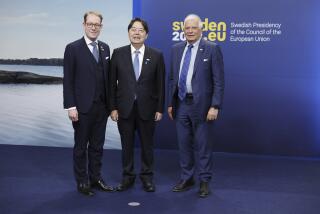How Dependable a Security Partner?
- Share via
CAMBRIDGE, MASS. — As tensions in Taiwan Strait recede, the United States has an opportunity to preempt another crisis. One of the pillars of regional stability is under strain, possibly rotting from within. The Taiwan crisis was the latest test of Japan’s commitment to its U.S. security alliance and to the role it plays in preserving peace in Asia. The alliance is the centerpiece of both nations’ strategies in the Pacific. Former Prime Minister Yasuhiro Nakasone aptly referred to Japan as “America’s unsinkable aircraft carrier” in the Pacific.
Indeed, the U.S.-Japan alliance has been one of the most durable partnerships of the past 40s years. but remains unadjusted despite the end of the Cold War. Trade and technology issues have strained the relationship, but the alliance has yet to be tested in the security realm. Assurances by Clinton administration officials notwithstanding, it is unclear just how Japan would respond in a regional military crisis, how committed it is to the alliance and whether it shares U.S. interests in the region more generally. Alliance “durability” may conceal a brittleness in the two countries’ relationship.
Certainly, there are signs that Japan played and continues to play a positive--even if restrained--role in the current crisis. Prime Minister Ryutaro Hashimoto expressed regret over Beijing’s efforts to intimidate Taiwan in the weeks leading up to the presidential elections and strongly encouraged Chinese restraint. The Japanese Diet began debating legislation that would permit Japan to support the U.S. military logistically. And Japanese actions speak even louder than Japanese words: Japan deployed a coast guard “cutter” (larger than many destroyers) to a position near the recent Chinese missile-test sites. In further evidence of tacit Japanese support, the Tokyo-based U.S. Seventh Fleet and the Okinawa-based U.S. air forces that patrolled near Taiwan did not attract popular opposition in Japan.
There are, however, ample reasons for pessimism. Despite its dependence on Middle East oil, during the Gulf War, Japan refused to place soldiers in harm’s way, citing legal constraints. Only after difficult negotiations did it generously contribute financial support. In 1994, when tensions rose on the Korean peninsula, Japan refused a U.S. request to commit support of minesweepers in the event of conflict. This seemed especially galling, given that North Korea’s missiles--potentially armed with the nuclear warheads--could reach Japan but not the United States.
Pessimists also point to widespread pacifist sentiment among the Japanese public and media. The rape of an Okinawan schoolgirl by U.S. Marines last September refocused public attention on the U.S. troops and on the rationale of the alliance itself. Constitutional restrictions on collective security limit Japanese participation in U.N. peacekeeping operations, and raise further doubts regarding military support from Tokyo in a China crisis.
Perhaps Japan’s national interests no longer correspond closely to those of the United States. Given high levels of Japanese investment in China, its reduced dependence on the U.S. market and its apparent preference for wealth over power, Tokyo would not benefit from complicity in a U.S. bid to contain, or even restrain, China. Moreover, given Japan’s reluctance to fully confront its war crimes, an assertive Japanese military in the region would likely generate instability and accelerate what is already the world’s most active arms race.
But the United States and Japan do have common interests, and it is high time to address them. Earlier this month, former Prime Minister Morihiro Hosokawa told a Seattle audience that a U.S.-Japan alliance needed “redefinition” in light of China’s new power; he asked how far Japan can be expected to go in support of the global strategy of the U.S. military. As Hosokawa and Hashimoto have each noted, Japan shares the U.S. concern for regional stability. Both nations have an overriding interest in freedom of navigation, and both benefit from strong democratic institutions.
Ambiguity in this relationship serves no one. Unanswered questions about Japan’s commitment to the alliance and about its role in the region threaten its viability into the 21st century. Continued Japanese statements that “we remain committed to the U.S.-Japan alliance” are not enough; neither are incantations of the now stale U.S. mantra: “the U.S.-Japan relationship is the most important bilateral relationship in the world, bar none.” In mid-April, Prime Minister Hashimoto will meet President Bill Clinton in Tokyo. Their summit’s “joint declaration” provides an opportunity to move beyond platitudes and to provide a clear accounting of our nations’ interests and how our alliance might achieve them.
Only by explicitly adjusting to the realities in Northeast Asia and by clarifying both nations’ respective roles, missions and responsibilities can the U.S.-Japan alliance continue to be a positive force in limiting the possibility for future conflicts.
More to Read
Sign up for Essential California
The most important California stories and recommendations in your inbox every morning.
You may occasionally receive promotional content from the Los Angeles Times.











